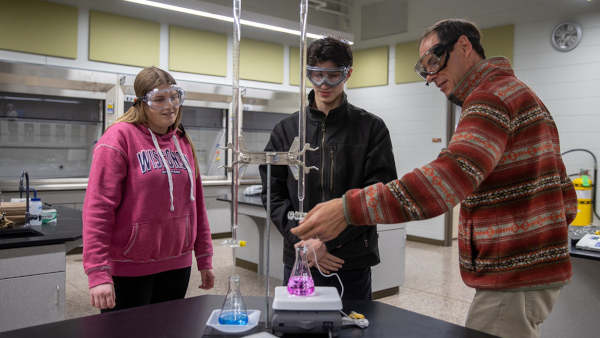Each year, thousands of undergraduate science majors across the country take the Standardized National Exam prepared by the American Chemical Society, which measures student achievement after the first year of undergraduate chemistry instruction. UW-Platteville Baraboo Sauk County Chemistry Professor Dr. Stephen Swallen has been guiding his students through the assessment test for many years and has been achieving remarkable success. Over the last six semesters, chemistry students at UW-Platteville’s branch campus – including many non-science or undecided majors – have typically scored well above the national average, with classes averaging in the 60th percentile or higher of all national test-takers.
Swallen attributes the test results to an innovative teaching practice he’s been honing and developing over many years – concurrently teaching the higher-level math that’s routinely a prerequisite for college chemistry right alongside the concepts and building blocks that are a fixture of a standard undergraduate chemistry course.
“Completing and achieving success in college algebra, and often higher-level math, is typically a prerequisite for most undergraduate science classes,” explained Swallen.
But many Baraboo Sauk County students haven’t met that goal when they start, and Swallen wanted to help create a way to open first-year science classes so students could meet their requirements for general education or stay on pace for higher level science during their first two years.
“I reconfigured General Chemistry as ‘General Chemistry I with Math Development,’ which includes additional emphasis on analytical thinking, graphing and many of the math tools scientists use, while at the same time covering all the chemistry concepts and topics that are typically in an undergraduate course,” said Swallen.
Students who need to be raised up to the level of comfort and competency required in chemistry get the extra instruction and support they need, while students with a stronger math background benefit from the math reinforcement, said Swallen. The higher ACS test scores show the combination is serving students well.
Swallen said he finds that working with and learning the math and analytical tools scientists use while also covering the material of first-year college chemistry helps reinforce each piece for students. Bringing them together in the curriculum gives those who may have struggled with either part on its own a more cohesive picture of the math and science working together. Combined with intensive attention for every student in class and building a culture of collaboration and group study throughout the semester, Swallen thinks the curriculum will keep serving students better and better.
“Students can really succeed in chemistry while still learning the math they need,” said Swallen. “I think the achievement of our students shows that.”
Written by John Christensen
Link to original story: https://www.uwplatt.edu/news/chemistry-students-baraboo-sauk-county-score-highly-national-assessment

